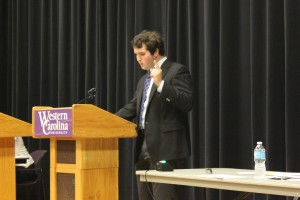In 1858, Abraham Lincoln challenged Stephen A. Douglas for the Illinois Senate seat. The two participated in a series of seven debates in the state, and Douglas won the election. These debates, which are taught in history classes across the nation because they were a “war of ideas,” are dubbed the Lincoln-Douglas debates.
The Organization of Ebony Students (OES) took the historical nature of those debates and set them in motion with one of their own on the pressing concerns of affirmative action.
Mahogany Smith, president of the OES, put on the event as part of Black Awareness Week. Inspiration for the debate stemmed from the 2007 film, The Great Debaters. The film is based on an article written about the Wiley College debate team by Tony Scherman in the 1997 spring issue of American Legacy. Based on a true story, the adaptation depicts professor Melvin B. Tolson moving students to form the school’s first debate team in 1935. Efforts from Tolson were in an attempt to place his team on equal footing with whites in the American South. His team eventually went on to challenge and defeat Harvard in the national championship.
“It was truly after that,” Smith said. “I wanted an event just to promote black awareness.”
According to the American Civil Liberties Union, “affirmative action is one of the most effective tools for redressing the injustices caused by our nation’s historic discrimination against people of color and women, and for leveling what has long been an uneven playing field.” The historic discrimination referenced to those of African-American heritage deals with the Jim Crow laws and lynching mobs in the 1930s.
The WCU debate featured African-American, Caucasian, female, and male students presenting arguments for both sides of the controversial issue. A panel of judges determined the strength of what was said as the participants presented to an audience consisting of students and faculty. It was a friendly atmosphere without any real pressure. However, the issue itself is very real.
Junior Garrett Whipkey, President of WCU College Democrats, understands how pressing affirmative action is.
“I overheard some students before the debate saying they didn’t even know what affirmative action was,” Whipkey said. “It influences federal, state, and college admission policies in large ways so it’s very important we know what’s going on.”
President Obama has been engulfed by the affirmative action tidal wave since he first took office in 2008. As the first African-American president, the topic immediately became a focal point for his presidency, but no decisions have been made. Now in 2013, Obama may not be the governing body responsible for one of the most historical and monumental decisions in history. The United States Supreme Court will be.
News surrounding the Supreme Court’s involvement can be found here.
The verdict remains behind closed doors, but the nation will wait for those doors to open.
More details to follow affirmative action coming soon.



